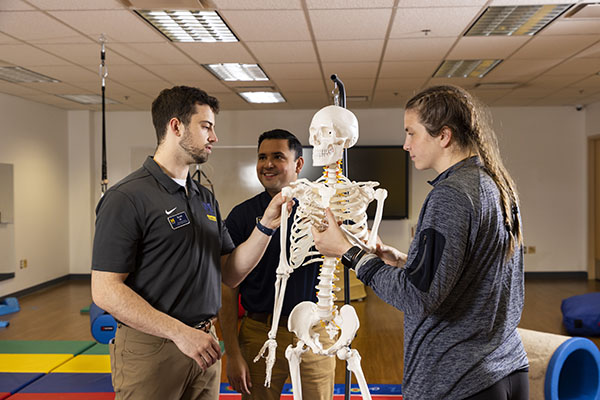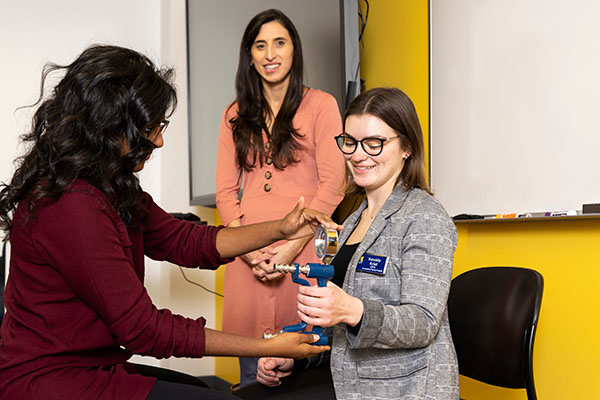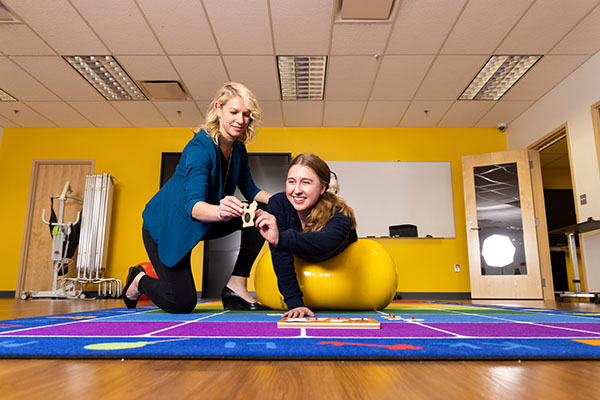How to become an occupational therapist and transform lives with UM-Flint

If you're passionate about helping others achieve their fullest potential and are considering a career in occupational therapy, you're on the right track. Occupational therapists play a crucial role in enabling individuals of all ages to participate in everyday activities, despite physical, cognitive or emotional challenges. The journey to becoming an OT is rigorous but immensely rewarding. One program that prepares students for this vital profession is the University of Michigan-Flint's Occupational Therapy Doctorate program.
Understanding the Role of an Occupational Therapist
Occupational therapists help patients develop, recover, and improve the skills needed for daily living and working. They work with people of all ages, from children with disabilities to adults recovering from injuries, and elderly individuals experiencing physical and cognitive changes. Their goal is to enable their clients to lead independent, productive, and satisfying lives.

Educational Pathway to Becoming an Occupational Therapist
You may wonder how you can become an occupational therapist. There are three primary things that you must do to start your journey toward this rewarding career.
- Earn a bachelor's degree. The first step is obtaining a bachelor's degree, preferably in a field related to health sciences or psychology. Common majors include biology, kinesiology, psychology, and health science. These programs typically provide the foundational knowledge necessary for advanced studies in occupational therapy. If you received a degree in another area, don't worry, OTD programs require specific prerequisite courses that anyone can complete. Prerequisite courses are typically in subjects like anatomy, physiology and psychology, among others. At some institutions, like UM-Flint, you may be able to accelerate this degree through an accelerated degree pathway program.
- Gain relevant experience. Volunteer or work experience in a healthcare setting is invaluable. Many, but not all, OT programs require or highly recommend applicants to have hands-on experience. This can be achieved by volunteering in hospitals, clinics, or schools where you can observe and assist OTs. Through these experiences, you are also able to develop relationships with existing practitioners who can help you by writing letters of recommendation and opening doors to a potential clinical opportunity while enrolled in an OTD program.
- Pursue a graduate degree. After completing your bachelor's degree, the next step is to enroll in an accredited graduate program in occupational therapy. UM-Flint offers a distinguished Occupational Therapy Doctorate program designed to equip students with the knowledge and skills needed for a successful career in OT. OTD programs take approximately three years to complete and provide you with all of the knowledge and practical experience that you need to be ready for your career after graduate school.

Why Choose UM-Flint's OTD Program?
- Accreditation and reputation. The program was the first OTD program in the state of Michigan to be accredited by the Accreditation Council for Occupational Therapy Education, ensuring that it meets the highest educational standards. The University of Michigan is globally recognized for excellence in education and research.
- Comprehensive curriculum. The OTD program at UM-Flint offers a comprehensive curriculum that covers all aspects of OT, including advanced clinical practice, research and leadership. Students gain in-depth knowledge and hands-on experience in various settings, preparing them to address the diverse needs of their clients.
- Interprofessional education. The program emphasizes interprofessional education, allowing students to collaborate with peers from other healthcare disciplines. One way this happens is through the Health Equity, Action, Research, and Teaching pro bono clinic. This interdisciplinary approach fosters a holistic understanding of patient care and prepares students for real-world healthcare environments.
- State-of-the-art facilities. UM-Flint provides access to advanced facilities and resources. Students benefit from cutting-edge technology and equipment, enhancing their learning experience and ensuring they are well-prepared for clinical practice.
- Experienced faculty. The OTD faculty at UM-Flint consists of experienced professionals who are leaders in the field of occupational therapy. Their expertise and mentorship provide students with invaluable insights and guidance throughout their educational journey.
- Alumni Making a Difference. The OTD program has had the pleasure of graduating many students who are now making a difference throughout Michigan and beyond. Whether it is individuals like Shanna Haver, whose life-changing sailing trip paved the way to a new career and opportunities for mobility for many others to Quinn Counseller, Owner of Neuroplastic Rehab, LLC, offering patients in-home neuro-rehabilitation, our alumni are making sustainable differences in the profession and in the lives of their patients!

Licensure and Certification
After completing your OTD degree, the next step is to obtain licensure to practice as an OT. This involves passing the National Board for Certification in Occupational Therapy exam. Each state also has its own licensure requirements, so it's important to check the specific regulations.
Continuing Education and Professional Development
OT is a dynamic field that continually evolves with new research and techniques. As an OT, you will need to engage in ongoing professional development to stay current with the latest advancements. Many states require continuing education for license renewal, and participating in workshops, seminars and advanced courses is beneficial for career growth.
Conclusion
Becoming an OT can be a fulfilling career choice that offers the opportunity to make a significant impact on people's lives. The journey requires dedication, education and hands-on experience, culminating in a rewarding and impactful profession. UM-Flint's Occupational Therapy Doctorate program provides an excellent pathway, offering top-tier education, comprehensive training, and the support needed to succeed in this vital health care field. If you're ready to embark on this exciting journey, consider UM-Flint's OTD program as your stepping stone to a remarkable and difference-making career.
For more information about UM-Flint's Occupational Therapy Doctorate, visit the program's webpage.
Related Posts
No related photos.
Christopher Lewis
Christopher Lewis is the director of graduate programs at UM-Flint. He can be reached at drclewis@umich.edu.